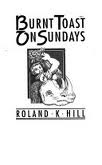BURNT TOAST ON SUNDAYS is a comic novel about the romantic misadventures of a young Zimbabwean farmer named Tom Burnham. Published in 1995, events in Zimbabwe have turned this frothy and fun book into a rather sad glimpse into a lost way of life.
The novel opens with Tom trying to make his own breakfast one Sunday morning. This goes so horribly wrong that he concludes he needs a wife. I know: how romantic. I hope Tom will marry me! What a charmer.
His friend Cliff organises a dance at his house, and Tom tests all the potential girls by having them each fry him an egg. No one makes the grade, and he decides to go on holiday to London. This in itself is an interesting perspective on a Zimbabwe I barely remember – the pre-diaspora country, in which going abroad is an event, rather than a routine, and where the airport is packed with tourists and multiple international airlines. In London he meets an English girl, who he invites to the farm to visit. Much hi-jinks ensue, involving rhinos and scorpions and white-water rafting. All ends happily of course with a wedding on the farm.
In the final scene, the English girl confesses she was unsure about living on the farm at first, but she accepts it, because ‘the farm is you.’ Well, the farm’s probably not going to be him for too much longer, unless he has some very good government connections. Shame. If Tom’s a real person, he’s living in a semi in Slough right now.
While the book certainly has some flaws – some awkward issues of style, and an over-reliance on cliches – it is overall an entertaining read. It is famously very difficult when writing in a country without a strong literary tradition not to simply mimic dominant traditions from elsewhere, and I must applaud Mr Hill on writing a very Zimbabwean little book, and not a pastiche of English or American models. He manages to include rhinos, sunsets, and veldskoens without sounding at all like he is writing an exotic travelogue, an endeavour at which many finer writers have failed spectacularly.
In case you plan to buy this book, I should caution that it’s price is probably out of your reach. I see on the inside front cover that it sold for $15,000. So it’s also in its own way a window into a totally different period in Zim history. $15,000! Ah, hyperinflation. I almost kind of miss it.


